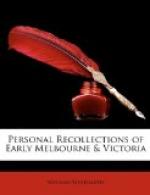CHARLES JOSEPH LA TROBE, C.B., SUPERINTENDENT OF PORT PHILLIP, AND FIRST LIEUTENANT-GOVERNOR OF VICTORIA.
“However God or fortune cast my lot,
There lives or dies...
A loyal, just, and upright gentleman.”
—Richard II.
The more I saw of the subject of this sketch, over nearly all the fifteen years of his unusually prolonged and varied officiate, the more I explained his case by the excusing consideration that he was where he was without his own consent. He was naturally a quiet, amiable, unambitious man, full of official activity and ability, in a prescribed line, or under the instructions of superiors. Thus commended at Sydney, he accepted, as matter of course, or of duty, his appointment by the Governor, in 1839, to the Superintendency of the Port Phillip community, a small body as yet, although making an ominously loud noise upon the far southern skirts of the vast colonial expanse of which Sydney was then the official and business centre. The charge did not then seem to threaten to be an anxiously large one, and in any case his inauguratory office might hardly remove him from the accustomed instruction of superiors. What he did not bargain for was that the child he went to nurse was to rush almost from the cradle into manhood; and the little “settlement” he began his reign with to be, ere he had done with it, the most notable, if not indeed actually the most important, colony of the empire.
He was a Moravian Christian, of a well-known name in that excellent body, and possessed of all its virtues; he was, besides, a well-educated gentleman. The pure and happy home which he transferred to the new scene was of priceless value to its society, and all the more so at a time when such virtuous homes, in such high quarters, were by no means over common thereabout. But with a natural shyness, and, in a socio-political sense, timidity of character, which in ordinary circumstances are feelings leaning to the better side, he exemplified how a good man may not always be a good ruler of men. The diffidence is often mistaken by the ruled, and always disappointing; and in public affairs it is apt, as Mr. La Trobe but too well illustrated, to take the inconvenient and injurious form of personal indecision.
He had not a particle of pride or selfishness, hardly even of the commoner infirmity of vanity. He would, whenever possible, take a roundabout to escape observation, but if even the humblest colonist persisted to address him, unrepelled by the evident tendency to “move on,” he would be as frank and unceremonious as our Queen in a Highland cottage. We regret that so righteously-stored a man should make a bad Governor; but so it was, none the less.




